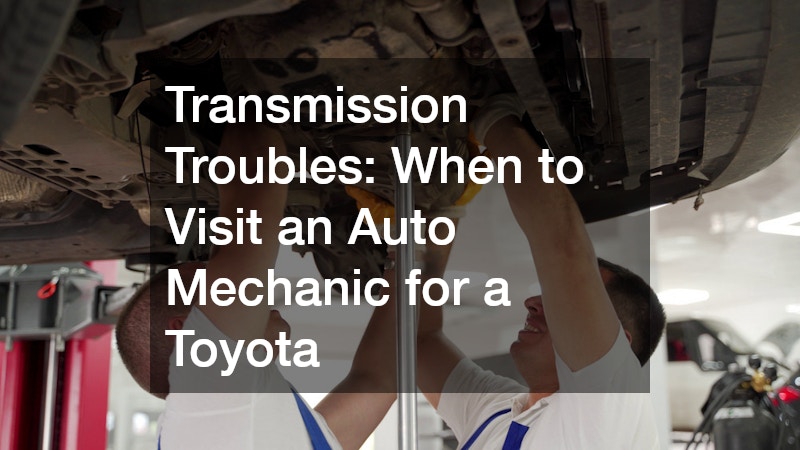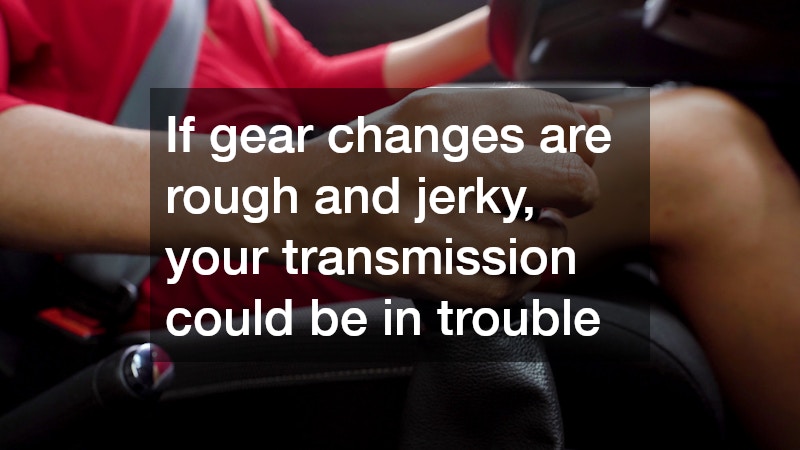Highlights:
-
Transmission issues in Toyotas often start small but escalate quickly.
-
Warning signs include slipping gears, rough shifting, leaks, and burning smells.
-
DIY checks (fluid level, noises, leaks) help but don’t replace professional diagnosis.
-
Dealership Toyota mechanics offer expertise, while independent auto mechanics may save costs.
-
Preventive maintenance—fluid changes, inspections, and gentle driving—extends transmission life.
-
Early repair saves thousands compared to full rebuilds or replacements.

Toyota has long been known for building reliable, long-lasting vehicles. However, like any car, Toyotas are not immune to transmission problems. Transmission issues can be subtle at first but, if ignored, they can quickly snowball into costly repairs or even complete transmission replacement. Knowing when to seek help from an auto mechanic can make all the difference in keeping your car on the road and avoiding unnecessary expenses.
This guide covers the most common Toyota transmission problems, warning signs to look out for, what repairs you might face, and how to decide whether a dealership or an independent Toyota mechanic is the right choice.
Why Transmission Maintenance Matters for Toyota Owners
The transmission is one of the most critical components in your Toyota. It transfers engine power to the wheels, ensuring smooth acceleration and consistent performance. When the transmission begins to fail, your car may show symptoms such as slipping gears, rough shifting, or delayed acceleration.
Unlike oil changes or brake pad replacements, Toyota transmission repairs are not routine maintenance—they are often urgent and expensive. This makes it essential for owners to know when to see an auto mechanic for a Toyota transmission issue before the situation escalates.
Key reasons to maintain your Toyota’s transmission:
-
Transmission problems worsen quickly if ignored.
-
Regular inspections can prevent expensive rebuilds.
-
Smooth shifting ensures better fuel efficiency.
-
A properly maintained transmission prolongs the overall life of your Toyota.
Common Transmission Problems in Toyotas

Different Toyota models—whether equipped with automatic, manual, or continuously variable transmissions (CVTs)—can face unique issues. Below are some of the most reported problems and why you should see a qualified Toyota transmission mechanic if you notice them.
1. Transmission Slipping
When your Toyota struggles to stay in gear or feels like it suddenly “slips” into neutral, this is a clear warning sign. Slipping gears usually indicate worn-out clutches, damaged transmission bands, or low transmission fluid.
2. Delayed or Rough Shifting
If you feel hesitation when accelerating, or if gear changes are rough and jerky, your transmission could be in trouble. Automatic Toyota models with high mileage are especially prone to this issue.
3. Transmission Fluid Leaks
Red or brown fluid under your car is often a transmission leak. Without enough fluid, the system can overheat and fail. Only an experienced auto mechanic for a Toyota should handle these repairs, as improper sealing can cause repeated leaks.
4. Unusual Noises
Whining, grinding, or clunking sounds from under the hood may indicate damaged gears or bearings. These noises often grow louder with acceleration.
5. Warning Lights
The “Check Engine” light may illuminate due to transmission issues, not just engine problems. Modern Toyota vehicles often have sensors that detect transmission errors.
6. Overheating Transmission
If you notice a burning smell while driving, your transmission may be overheating. This often happens when the fluid is old or insufficient.
Toyota Models with Known Transmission Issues
While Toyota has an excellent reputation for durability, some models have reported more transmission complaints than others.
-
Toyota Camry – Certain years experienced torque converter failures, leading to shuddering and slipping.
-
Toyota Corolla – Some models had CVT transmission problems, including jerky shifting and hesitation.
-
Toyota RAV4 – Owners of earlier models reported hard shifting and transmission failure around 100,000 miles.
-
Toyota Tacoma – Some drivers noticed hesitation when accelerating, often traced to transmission programming issues.
-
Toyota Prius – The hybrid’s eCVT can last long but requires specialized hybrid-certified Toyota mechanics.
Knowing these common issues can help you recognize symptoms early and visit a certified Toyota auto mechanic before major damage occurs.
Warning Signs You Should Visit an Auto Mechanic for a Toyota Transmission
Spotting the early signs of transmission failure can save you thousands in repair costs. If you notice any of the following, do not delay seeking help from a Toyota mechanic.
Key Warning Signs:
-
Gear slipping or hesitation when shifting
-
Delayed acceleration even when pressing the gas
-
Fluid leaks beneath the vehicle
-
Transmission warning light or “Check Engine” light
-
Burning smell after driving long distances
-
Shuddering or jerking during gear changes
-
Strange noises like whining, grinding, or humming
If your Toyota exhibits even one of these symptoms, it’s time to book an appointment with a trusted auto mechanic for Toyota repairs.
DIY Checks Before Visiting a Mechanic
Before rushing to the shop, you can perform a few simple checks at home. These won’t replace a professional diagnosis but may help you understand whether the issue is minor or urgent.
-
Check the Transmission Fluid: Look for proper fluid level, clarity, and smell. Burnt-smelling or dark fluid signals trouble.
-
Observe Driving Behavior: Note if the issue happens at certain speeds or in specific gears.
-
Listen for Sounds: Identify whether noises occur while shifting, accelerating, or idling.
-
Check for Leaks: Inspect your driveway or garage for reddish-brown fluid spots.
If these checks confirm abnormal conditions, do not delay—schedule a visit to a professional Toyota auto mechanic immediately.
Professional Repair Options for Toyota Transmissions
When visiting a mechanic, you’ll encounter different levels of transmission repair depending on the severity of the issue.
1. Fluid Flush or Replacement
Old or contaminated transmission fluid can cause slipping or overheating. A mechanic may recommend a full fluid flush or replacement.
2. Minor Repairs
Replacing solenoids, sensors, or seals can fix small problems before they become major.
3. Rebuilding the Transmission
If gears, clutches, or bands are severely worn, rebuilding may be necessary. This involves replacing damaged parts while keeping the main housing.
4. Full Transmission Replacement
In the worst cases, you may need a brand-new transmission. Though costly, this ensures long-term reliability.
Dealership vs. Independent Auto Mechanic for a Toyota
One of the biggest decisions you’ll face is whether to take your Toyota to a dealership or an independent mechanic. Both have advantages and drawbacks.
Dealership Toyota Mechanics
-
Pros: Factory-trained technicians, genuine Toyota parts, specialized equipment.
-
Cons: Higher repair costs, longer wait times.
Independent Toyota Auto Mechanics
-
Pros: Lower labor rates, personalized service, flexibility in using OEM or aftermarket parts.
-
Cons: Quality varies—must verify certification and Toyota experience.
When dealing with a major transmission repair, many Toyota owners choose dealerships for peace of mind. However, a skilled independent auto mechanic for a Toyota can provide excellent service at a more affordable price.
Preventing Toyota Transmission Problems
While some failures are unavoidable due to age or design flaws, regular maintenance greatly reduces the risk of transmission troubles.
Preventive Maintenance Tips:
-
Change Transmission Fluid every 30,000–60,000 miles, depending on your Toyota model.
-
Avoid Aggressive Driving, which stresses gears and clutches.
-
Warm Up Your Vehicle before driving in cold weather to protect fluid viscosity.
-
Fix Leaks Immediately to prevent overheating.
-
Schedule Regular Inspections with a qualified Toyota mechanic.
Cost of Toyota Transmission Repairs
Repair costs vary widely depending on the extent of the problem and the type of mechanic you choose.
-
Fluid change/flush: $150–$300
-
Minor repair (sensors, solenoids, seals): $300–$1,000
-
Transmission rebuild: $2,500–$4,000
-
Full replacement: $4,000–$7,000+
By addressing early signs and working with a trusted Toyota auto mechanic, you can often avoid the highest costs.
In Closing
Transmission problems can be intimidating, especially since they are among the most expensive repairs a Toyota owner might face. But by recognizing the warning signs early, performing simple checks, and knowing when to seek help from an auto mechanic for a Toyota, you can protect your vehicle from catastrophic failure.
Whether you drive a Camry, Corolla, RAV4, Tacoma, or Prius, staying on top of transmission health is one of the smartest investments you can make in your Toyota’s longevity. A trusted Toyota mechanic not only saves you money but ensures your vehicle continues to deliver the reliability Toyota is known for.